Crash Course in Aging Cider with Brian Rutzen
With every new cider we release, and particularly with bottle conditioned varieties like our La Mûre, there are always at least a handful of curious fans reaching out to learn a little bit more about the individual ciders and whether they will age well. While aging alcohol in general is often considered common place, red wine or scotch immediately comes to mind, the re-emergence of aged ciders in the US over the past decade has left many cider fans wondering where to begin. What nuances or differences are there in the aging process from cider, beer or wine? Which ciders age best, and which should be enjoyed as fresh as can be?
To start that deep dive, we had our official Windy City Cider Witch & Sales Person Extraordinaire, Aja, sit down with Brian Rutzen of the Northman Cider Pub & Bistro to have an in depth conversation on aging ciders. Covering everything from important notes on cellaring any cider, beer & wine to Brian’s personal favorite aged ciders, this is a crash course in aging no cider fan will want to miss!
(Don’t have time to read it all? Check out the interview recording below!)
AJA – We are talking on the topic of aging ciders, so Brian why don’t you just give us your first and last name, and your position.
BRIAN – Yeah, my name is Brian Rutzen and I am the Cider Director at the Northman Cider Pub & Bistro in Chicago, Illinois.
A – Baller. I dunno, I’m gunna ask something that doesn’t have to do with the topic really quick. How long have you been working cider. For like, a very a long time?
B – I have a hazy memory because the early days I was working for cider but not making any money. So maybe for 2 years I scrambled to create my own cider business. While that didn’t work out, it certainly pushed me to the industry and the players in it. I have been making cider for over 12 years, I’ve been a judge or a steward at GLINTCAP for 8 years in a row, and I would say I’ve been working in cider for 6 years, 7 if I looked in a calendar. And that’s just a mix of working as a broker, getting brands in, then working with folks like Mike Beck at Uncle John’s Cider and helping his brand grow in Chicago, now and then as part of the Northman, that project began 4 years ago but we’ve only been open for 2 years so, you know, it’s been a lot of work but the fruit of the labor has come along in the past 2 years.
A – That question was more for me than anything, because I realized I don’t really know the full breakdown. Alright, so getting into aging ciders then… Do you have an overall philosophy when it comes to cider and aging.
 B – I mean, a lot of times it’s really dictated by supply, and if I get something I enjoy, I’ll buy two. Sell one now, sell one later. I do like to share cider with people when its released because that is probably when the cider makers feel they’re ready. Cider makers might have something they worked on last week that they feel is ready, or they have stuff they finished up a year or two ago and they have just been waiting for the right time of maturity to release. So when it’s released I like to put it out there, but if it is something that takes my notice I will set an extra case or two, or keg, aside and then bring it out for the right occasion. I don’t have a time in mind, like, I’m going to set this down for two years or whatever. It’s more, setting it down and waiting for the right occasion, seeing how it emerges. Opening a bottle and saying ‘oh that’s going in the right direction’, maybe let it go a little bit longer, or if its achieved a nice destination then I’ll just open up the rest of the case and feature it.
B – I mean, a lot of times it’s really dictated by supply, and if I get something I enjoy, I’ll buy two. Sell one now, sell one later. I do like to share cider with people when its released because that is probably when the cider makers feel they’re ready. Cider makers might have something they worked on last week that they feel is ready, or they have stuff they finished up a year or two ago and they have just been waiting for the right time of maturity to release. So when it’s released I like to put it out there, but if it is something that takes my notice I will set an extra case or two, or keg, aside and then bring it out for the right occasion. I don’t have a time in mind, like, I’m going to set this down for two years or whatever. It’s more, setting it down and waiting for the right occasion, seeing how it emerges. Opening a bottle and saying ‘oh that’s going in the right direction’, maybe let it go a little bit longer, or if its achieved a nice destination then I’ll just open up the rest of the case and feature it.
A – Alright, so in general as you are talking about aging cider, pulling cases, setting things aside… what traits do you look for in a new cider that you hope is going to age well and improves in time. What makes that call for you?
B – Largely tannin, really, the fruit. The quality of fruit, the unique properties of the fruit. If its a high tannin cider that typically means it’s going to do well over time. Acidity also has a nice effect of preserving cider, but then some of those qualities might be diminished over time. And then of course, it depends on how it was made. You know, if it was pasteurized cider, sterile filtered, maybe I’m not to keen on cellaring that for any length of time. Certainly bottle conditioned ciders, which are still developing in the bottle, that is really the whole purpose behind aging and cellaring ciders, because then you know it’s still becoming something there inside the bottle. Other things might not be quiet so dynamic as it develops in the bottle, maybe a little bit more stable, but has all those other things I was talking about; tannins, acid, and really to be honest, alcohol. Certain alcohol levels will lend to time much better. But that’s not to say I wouldn’t lay down a lower alcohol perry for a couple years, because perry is very unique! Especially if it’s got a some cool tannins in that perry.
A – I was going to say, are the traits different for a perry and a cider, then, if you’re looking at aging?
B – Yeah, yeah. The lower alcohol is one thing, so I’m certainly not going to go for to long there. But if it was a draft perry, I’d feel better about keeping it for more than two years. Where as bottle perry, typically two years, yeah that will probably be good. But it can go longer. I mean, ciders, perries, 5 years, 6 years, 10 years… yeah maybe. We’re not talking about the decades you would get in red wine and things like that.
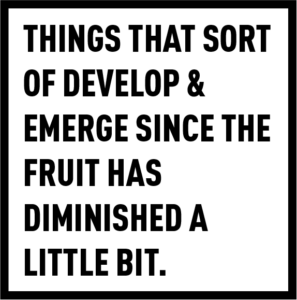 A – What changes do you usually see in a cider when it ages (I guess that would depend on time frame and stuff). And what changes do you hope for?
A – What changes do you usually see in a cider when it ages (I guess that would depend on time frame and stuff). And what changes do you hope for?
B – Sure of course. In general fruit is at the heart of all cider, but time tends to diminishes any of the fruit forward character. Now, maybe not all of it, but it might dial down the juiciness as it where, or the fruit character of certain ciders, allowing other properties to stand up a little bit further. Like the tannin, the acid, you might get some other complex layers, minerality, things that sort of develop & emerge since the fruit has diminished a little bit. These other qualities can come to the forefront. So that’s what I’m looking for, those unique properties that you wouldn’t find in a freshly released cider.
A – In the categories of French cider, English cider, Spanish Austrian cider, New World Modern cider & New World Heritage cider, which ones have you found age well past the first year?
B – French ciders & English ciders, yes, because you’re talking high quality bittersweet fruit that’s high in tannin. Typically a little bit lower in acid. And while there’s really cool tannin in Spanish cider, and high acid in Spanish cider, that’s the one category that I would typically want as fresh as possible. I don’t lay Spanish cider to down to age. Unless it is maybe, the Nueva Expresion (the new expression), Espumantes, the stuff that has been maybe slightly filtered, sweetened. There are ciders that are Méthode Champenoise, you know, cork & cage bottles, higher ABVs. Those type of ciders coming out of Spain I do set aside, but for Sidra Naturale, fresh is best.
English & French, a couple years might let some of those cooler qualities to develop. As some of that fruitiness diminishes, you might get some more of the other spicy notes. Baking spice, caramel apple flavors; rich, deeper aromas. So those things I’m looking for in those styles.
Modern ciders is another one I might not be looking to age, whereas Heritage and Traditional ciders, yes! I have come across bottles of American made, heritage, orchard based ciders, several years old that are fantastic because they almost dry out from that fruit layering down a little bit over time. You get these fireworks of minerals and tannin that you might not have noticed before. Those I’m particularly interested in. And that might be because I have a personal affinity for those ciders. I like to see what’s happening in this country, and how the fruit supply is changing the cider industry. And what cider makers are doing with these varied sources of fruit, and what it can do for drinkers. You and me.
A – I dig it. Let’s talk cellaring and storage. What conditions should you keep cider in to age, and is there a proper temperature or certain condition you can recommend. Is it like beer? Is it similar to, mid cool temps?
B – There are those that say that really, really cold is not good for wine, not that its bad for wine, but it can sort of diminish some of those deeper, tannic notes that you get in wine. I think the cooler the better, stable is probably the best.
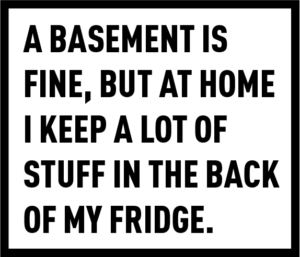
A – When you say stable you mean maintaining that temperature right?
B – Yeah, not to hot, not to cold, no back and forth. Cider is very forgiving in that department. Certainly beer is terrible in that department. You don’t want that warm, cold, back and forth, but cider is forgiving. Cider is not light struck the way beer is, either. Light struck is a quality that affects the hop character of beer. Well if you don’t have hops in your cider, you’re not going to worry about that too much. At the same time, I tend to prefer dark, cool, stable places. A basement is fine, but at home I keep a lot of stuff in the back of my fridge.
A – What do you recommend for people that live in cities, who don’t have basement space, who don’t have garage space? What do you recommend? Back of the pantry? Get a seperate little mini fridge?
B – Sure, but this weekend we’re going into 100°F temperatures, so if you are not in a central air apartment, I mean you might have window units but you might have those in your bedroom or wherever. So if you are keeping a certain room cool, maybe your bedroom closet would be fine. But I’ve kept stuff in my kitchen where I don’t have AC, and at the end of that season it has certainly changed. So I would rather err on the side of colder in the sense, if its something I want to hold on to for a while, I will stick it in the back of my fridge. If I think I’m going to drink it next week, I’ll bring it out early and get it back up to temperature. I know that’s not a very scientific answer.
A – That’s the thing though, sometimes you can’t have science in the city, you’ve just gotta make due. Speaking of aging in the back of the fridge, what ciders do you have in your ‘cellar’ that you are aging, or have been aging, and why are you excited about them?
B – I have a Tom Olivers Perry from 2 years ago in my fridge that I’m really excited about. Downstairs I have the only case available in Chicago of a Etienne Dupont Reserve. These are sort of the Cidre Bouche, the brut typical ciders but have been aged in calvados barrels. I’ve got a couple bottles of those that I’m super excited about. Hm… what else. I’ve got a couple English bottles. I have the 2nd iteration of the Gold Rush Collaboration between Tom Oliver and Greg Hall of Virtue Cider. Those bottles are changing in size and composition because he is also collaborating with Ryan Burke at Angry Orchard. Those bottles, the ones on my menu are #4, but I think they just released #5. So I have a #2 bottle downstairs that I am waiting to see how that has emerged. I am excited about that.
What else… I do have a Spanish bottle, a Spanish Méthode Champenoise bottle that I am aging. And a couple bottles here and there. Case wise, I don’t do agressive case aging. I will bring them out and feature them in the menu from time to time. And once I’m opening up that case I’ll sell it until it’s gone. Now that might take several months because these are the more expensive bottles. I don’t have an aggressive cellaring program here at the Northman, as far as setting several cases aside of a specific style. Largely that’s because of real estate. We’re a small, tiny, 100 year-old building here, so I don’t have this massive amount of room to hold onto a library of cider. But, me and my friends have got our own little things going, and we emerge every so often to bring out things to share with each other.
A – Have you ever discovered a hidden or forgotten, dusty bottle of cider that turned out to be a remarkable standout? A secret treasure?
B – An Uncle John’s Cider Rosé that they don’t really produce anymore, made from red fleshed fruit that they can’t really obtain in the same quantities. That was a cider that was 5 years old, and it was fantastic. I mean, really, really special stuff that emerged that wasn’t quiet there the first couple years that those bottles were being drank. Another Uncle John’s bottles, I was out in Portland and found a bottle of Melded that was for sale in a local bottle shop that I knew for a fact to be over 5 years old. Bought it, took it home to the hotel that night and drank it, and it was stellar. That diminished the fruit but with all the mineral qualities emerging to the forefront, really was subtle and beautiful.
A – That peaks my interest hard, Melded is like, my favorite thing. They did an incredible job, I am such a fan of that.
B – Yeah, and other weird stuff like that. Wild yeast fermented stuff, like Shacksbury’s Lost & Found series. They do those in very limited runs, and we found one of their earlier bottles and brought it out. While it was a gusher, a lot stayed in the bottle and we poured it out and drank it. It was really, really special. Their Lost & Found is their forged apple series that they do with wild yeast, and it was funky, but it was cool.
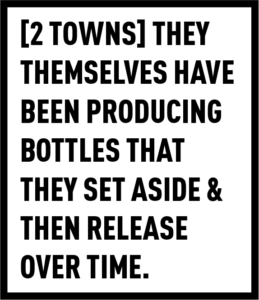 A – That’s awesome. Are there any North American ciders from modern companies that you think are producing ciders that age well.
A – That’s awesome. Are there any North American ciders from modern companies that you think are producing ciders that age well.
B – Not to be obvious about it, but 2 Towns is one of the few companies that is really ahead of the curve because they themselves have been producing bottles that they set aside and then release over time. So that I can go visit different harvests, go through their cellar series and sort of say ‘Hey, this is something that they’ve been holding onto that I just got ahold of and now want to share it.’ And while we know about regulations on the federal level about dates and everything, I’m not under those same restrictions. You [cider] makers are limited in what they can talk about, but my relationships with you guys give me the back stories to how these ciders are created and cared for. Then I can release them and tell that story to people. Specifically I am thinking of the lambic style La Mûre.
A – Oh well would you look at that, the 2016 Vintage just came in today to the Northman!
B – That’s right! We did the 2015 last year, right? That was unlike anything else on the menu. Some people thought it went to far, and some people adored it and came back bottle after bottle. It shows the deep complexity and breadth of style. You can’t say you don’t like any cider, because that doesn’t taste like any cider I’ve ever had. So for those that are open minded and curious, maybe they just haven’t found a cider they like. But if they stay open to the experience, they may fall in love one day. 2 Towns is very unique in that approach and probably does more than any other larger cider company that I know of. I mean, I know mom and pop, New York, Finger Lakes Farms is doing crazy stuff like that. But yeah, I’d have to say 2 Towns is pretty impressive on that front.
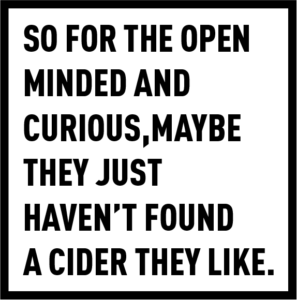
A – Sweet. Again, as far as ciders that age well. I know Angry Orchards has stuff that ages really well, Uncle John’s has stuff that ages really well. I think that in my experience for North American cider, there are a lot of creators and makers out there that have options for aging.
B – And I think the thing that those makers have in common, and might not be the thing all their ciders have in common, but that they all have ciders that are close to the orchard. The closer you are to the growers and the fruit and are able to create the blend, then you are in a much better position to create a cider that is worth laying down. It’s going to have all those qualities that we’ve talked about, decent acidity, depending on style. If its a French style maybe its a lower acidity with a more robust tannin. I would probably be remiss to say that whole bit without mentioning Kevin Zelinski of Easy Orchards. He’s really just a neighbor of you guys out in Oregon. He’s making low acid, high tannin, wild yeast fermented, bottle conditioned ciders. In a sense those are made for aging. They can change and go any which direction, but they are still developing in the bottle. If you get one of those bottles that are a couple years old, those bubbles have been forming for years and come out tiny, tight, and really really elevate the experience. I think that is sort of a benchmark to reach for a lot of people.
A – Are there any fruit or weird specialty ciders that you have been surprised by because they have aged exceptionally well.
B – Well I would say, we just talked about the La Mûre, that is sort of a unique, fruit, sort of odd style of cider. Again, the Shacksbury’s Lost & Found, very unique in its construction and expression. Hop ciders are not necessarily a cider that ages very well, because hops tend to lose their effectiveness over time. But they are really just added to cider for aroma, they’re not like a bitter boil or something like that. It’s not like it has to hold up to some strong malt background. Its so funny that hop ciders in a sense were created to entice beer drinkers, and yet many times express themselves more like a white wine with the floral notes of a Sauvignon Blanc. Those floral qualities can continue to develop and emerge over time, but I just can’t remember a hops cider I’ve had that’s over a year old.
A – This last question is for me personally. I consider myself, despite my position, still very, very new to cider. Just in general and in learning. So if you were going to recommend to someone who is very new to cider, but wants to try aging something, do you have any specific recommendations as far as bottles or varietals to look out for… for the newbies that is. Of course they could read this whole thing and take a lot away from it, but do you have sometime specific to point them to?
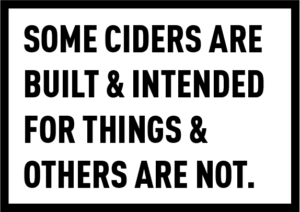 B – I’m not disparaging how ciders are packaged or going to market, but for specifically aging, screw tops are not ideal. Avoid those. Crown caps, cork n cage, those are better. And when I say screw tops I mean those tops that are meant to just click off from the local gas station. Screw cap wine caps that have a seal over them can do ok. I’ve got a few ciders down below from Germany that are probably 3 or 4 years old, and they have a screw cap. But they are wine grade screw caps, not these 12 oz bottles that you get at your local gas station. That’s what I mean there, not trying to disparage wine screw capping. Not that I am disparaging anything really, I just feel that some ciders are built and intended for things and others are not. In general I think that is kind of what you are looking for.
B – I’m not disparaging how ciders are packaged or going to market, but for specifically aging, screw tops are not ideal. Avoid those. Crown caps, cork n cage, those are better. And when I say screw tops I mean those tops that are meant to just click off from the local gas station. Screw cap wine caps that have a seal over them can do ok. I’ve got a few ciders down below from Germany that are probably 3 or 4 years old, and they have a screw cap. But they are wine grade screw caps, not these 12 oz bottles that you get at your local gas station. That’s what I mean there, not trying to disparage wine screw capping. Not that I am disparaging anything really, I just feel that some ciders are built and intended for things and others are not. In general I think that is kind of what you are looking for.
Other things folks are going to do is mind that temperature stability we talked about, and really the less you disturb them the better. A lot of times when you talk about developing cider in bottles there is stuff like lees, there’s yeast and things like that. Those considerations that should all be brought up.
A – Well awesome, thanks Brian!
 Aja Brothers is the resident Cider Witch of Chicago/Minnesota. When she’s not singing the gospel of 2 Towns to anyone that will listen, she’s working hard to further her cider education across the board, watching wrestling, and listening to podcasts like Song Exploder and Throwing Shade. She believes that good people and good product make all the difference in the current craft scene, and is grateful to have had many opportunities to work with both through bar management, craft beer sales, and with 2 Towns. She is also a champion at Icing her peers (if you don’t know what that is, now is a great time to learn and practice with your friends).
Aja Brothers is the resident Cider Witch of Chicago/Minnesota. When she’s not singing the gospel of 2 Towns to anyone that will listen, she’s working hard to further her cider education across the board, watching wrestling, and listening to podcasts like Song Exploder and Throwing Shade. She believes that good people and good product make all the difference in the current craft scene, and is grateful to have had many opportunities to work with both through bar management, craft beer sales, and with 2 Towns. She is also a champion at Icing her peers (if you don’t know what that is, now is a great time to learn and practice with your friends).